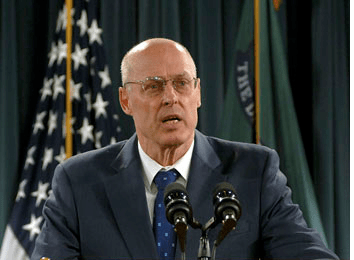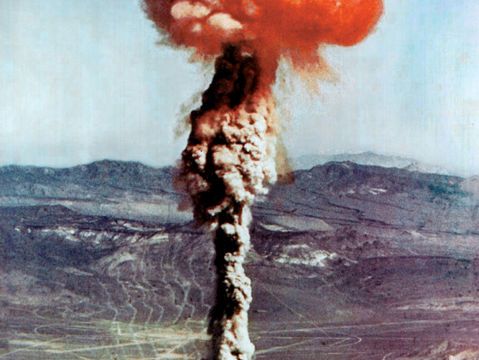In Defense of Paulson and Fuld

For this week’s installment of What Went Wrong?, we bring you the media perspective from Andrew Ross Sorkin, New York Times columnist and author of “Too Big To Fail,” and Chrystia Freeland, U.S. Managing Editor of the Financial Times.
Sorkin defends three things that have gotten a bad rap during the economic meltdown: Hank Paulson, financial television and Dick Fuld. History may look more fondly upon Paulson than he’s given credit for today, says Sorkin. And as for TV coverage of the crisis, it wasn’t as bad as people think. If anyone should know, it’s Sorkin—in his research for “Too Big To Fail,” he sifted through hours and hours of tapes. It’s no doubt that Dick Fuld has emerged as one of the poster children for the crisis, but that’s another thing with which Sorkin disagrees. As he points out, Morgan Stanley’s John Mack could have suffered the same fate as Fuld, had Mitsubishi not come to save them, or had the government not made them a bank holding company.
Freeland tackles questions about the push-pull between the news and editorial divisions of a global financial newspaper. She maintains that her publication aims to build a broad church of opinion, and insists that she is proud of the FT’s coverage of the economic crisis, especially those pieces by Martin Wolfe. Even the most ideal journalism wouldn’t have stopped the crisis, says Freeland.
Freeland also dissects the Efficient Markets Hypothesis (of which she is a vocal critic), and explains why it is one of the biggest casualties of the last year. Her big takeaway? Individual players pursuing individual interests collectively will not always create an outcome which is good for the collective or even for those individual players.
A network of top economics bloggers provided some questions for the interviews. They also weigh in on the answers every week:
Economist’s View – Mark Thoma, Professor of Economics, University of Oregon
Economics One – John B. Taylor, Professor of Economics, Stanford University and former Undersecretary for International Affairs, U.S. Treasury Department
The New Republic’s The Stash– Noam Scheiber
The New Yorker’s The Balance Sheet –James Surowiecki – Columnist, and author of bestseller The Wisdom of Crowds
Marginal Revolution – Tyler Cowen, Professor of Economics, George Mason University
Reuters Finance, Felix Salmon
The American Prospect’s Beat the Press – Dean Baker, Professor of Economics, Bucknell University and Co-Director, Center for Economic Policy Research
The Money Illusion – Scott Sumner, Professor of Economics, Bentley University
Café Hayek – Russ Roberts, Professor of Economics, George Mason University and a research fellow at Stanford University’s Hoover Institution
The Atlantic’s Atlantic Business Channel – Dan Indiviglio
The Fly Bottle – Will Wilkinson, Research Fellow, Cato Institute
The Big Questions – Steven Landsburg – Professor of Economics, University of Rochester and Columnist, Slate
Econlog – Arnold Kling, Adjunct Professor of Economics, George Mason University and former employee of both Freddie Mac and the Federal Reserve
The Atlantic’sAsymmetrical Information – Megan McArdle, Managing Editor, The Atlantic
Causes of the Crisis – Jeff Friedman, Visiting Professor of Political Science, University of Texas and Founding Editor, Critical Review,
National Review’sThe Corner/The American Scene – Jim Manzi – Chief Executive Officer, Applied Predictive Technologies
The Economist’sFree Exchange/The Bellows – Ryan Avent, Online Editor, The Economist
Naked Capitalism – Yves Smith, President of Aurora Advisors, and former employee of both Goldman Sachs and McKinsey & Co.





